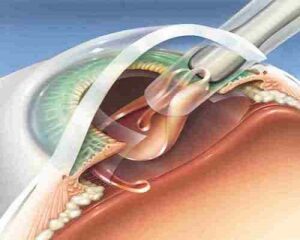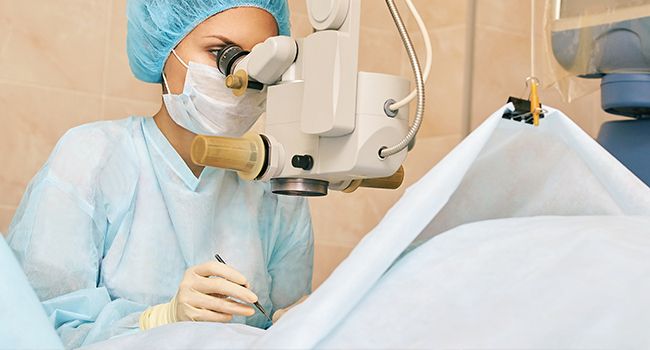If you are experiencing problems with your vision, you may be considering cataract surgery. This is a common procedure that can help improve your vision. In this blog post, we will discuss everything you need to know about MICS cataract surgery. We will cover the basics of the procedure, as well as some of the benefits and risks associated with it. If you are considering cataract surgery, this blog post is for you!
Contents
What Is MICS Cataract Surgery?
 MICS refers to Micro-Incision Cataract Surgery, a type of cataract removal surgery that uses a very small incision, usually less than 1.8 mm. This procedure is minimally invasive and can be completed in 10 minutes or less. It is often used to treat patients with very small or dense cataracts.
MICS refers to Micro-Incision Cataract Surgery, a type of cataract removal surgery that uses a very small incision, usually less than 1.8 mm. This procedure is minimally invasive and can be completed in 10 minutes or less. It is often used to treat patients with very small or dense cataracts.
Many people who need cataract surgery are able to avoid traditional, open-incision surgery with MICS. This is because the small incision used for this procedure means there is less trauma and scarring, which can lead to a faster recovery time than traditional cataract removal.
Thus, if you are considering cataract surgery, you may want to speak with your doctor to see if MICS is a good option for you.
How Does MICS Cataract Surgery Work?
During MICS cataract surgery, a small incision of less than 1.8mm or even 1.2mm is made in the cornea. This incision is then used to insert a probe that measures and corrects any astigmatism present. Then, a specialized instrument called an ophthalmic microsurgical system (OMS) is used to make further adjustments in the patient’s eye.
The lens of the eye is broken up into small pieces which are removed through the small incision. An artificial intraocular lens (IOL) is then inserted in its place. The IOL is designed to correct any refractive errors present in the patient’s vision such as nearsightedness, farsightedness, and astigmatism.
MICS cataract surgery is a quick and minimally invasive procedure that typically takes less than 10 minutes to perform. It is a type of treatment that does not require the patient to stay in the hospital or take any medications after the procedure. This makes it an attractive option for many patients who are looking for a way to improve their vision without having to deal with the risks and inconveniences of more traditional surgeries.
Is MICS Cataract Surgery Painful?
MICS cataract surgery is a minimally invasive procedure that typically does not require stitches and can be done using anesthetic drops instead of injections. This type of surgery involves making extremely small incisions in the eye to allow access to cataracts, which are then removed with specialized surgical instruments.
While MICS cataract surgery is usually a relatively painless procedure, as with any operation, there may be some discomfort afterward. The surgeon may prescribe medication to relieve any minor aches and pains associated with the procedure.
Which Is Better Phaco Or MICS?
There are always debates surrounding which procedure is better, Phaco or MICS cataract surgery. Both procedures have their advantages and disadvantages. Ultimately, the decision depends on the individual patient’s condition and the preference of the surgeon performing the surgery.
Phacoemulsification (Phaco) is a traditional type of cataract surgery that has been used since 1967. It involves using ultrasound energy to break up the lens and then suctioning out the fragments. This is a quicker procedure than MICS, but it requires larger incisions on the eye.
MICS (Microincisional Cataract Surgery) is a newer technology that was developed in 2001 in Spain. It uses an ultra-small incision that is only 1.8 to 2 millimeters long and 0.9-1.3 millimeters wide, making it much less invasive than Phaco surgery.
So, you can see that MICS cataract surgery has several advantages over Phaco. It is less invasive, requires smaller incisions, and leads to shorter recovery times. In addition, patients are able to resume their normal activities much sooner than with Phaco surgery.
What Are The Pros And Cons?
 Before undergoing MICS cataract surgery, it’s important to be aware of both the benefits and potential risks associated with this procedure. Let’s discuss both below:
Before undergoing MICS cataract surgery, it’s important to be aware of both the benefits and potential risks associated with this procedure. Let’s discuss both below:
Pros
- Increased visual acuity: MICS cataract surgery has been shown to provide excellent visual outcomes and a high level of patient satisfaction. The procedure can improve the clarity and sharpness of your vision, allowing you to see with greater detail than before.
- Fast recovery time: One of the top benefits of MICS is that it offers a much shorter recovery time than traditional cataract surgery. In fact, many patients report that their vision returns almost immediately after the procedure is completed.
- Minimally invasive: It requires a much smaller incision than traditional cataract surgery. This means there is less trauma to your eye and less risk of infection or other complications.
Cons
- Complications: As with any surgery, there is always the potential for complications. These can include infection, increased intraocular pressure, retinal detachment, and corneal edema. That said, these risks are greatly minimized when performed by a skilled surgeon, and all post-operative care is followed precisely.
- Higher cost: This surgery may be more expensive than traditional cataract surgery, as it requires specialized equipment and a skilled surgeon. This cost can vary widely depending on the area you live in and your insurance coverage.
- Not suitable for all types of cataracts: Although it is often an excellent option for those with certain types of cataracts, it is not suitable for everyone. Your ophthalmologist will be able to advise you on whether this procedure is the best choice for your specific condition.
All in all, there are always potential risks and benefits associated with any procedure. Talk to your doctor about whether MICS cataract surgery is right for you. With an in-depth consultation, you can weigh the pros and cons and determine if it’s the right choice for your individual needs.
Conclusion
In a nutshell, MICS cataract surgery might be a suitable option for those looking for a safer, quicker, and more comfortable alternative to traditional surgery. It typically involves the use of smaller incisions, less anesthesia, and shorter recovery times with fewer or no stitches required.
As always, it’s important to consult with your doctor to decide which cataract surgery is best for you. Because of its unique advantages, this surgery might be a great choice for those looking to get back to their normal routine as quickly and safely as possible.
Cataract surgery is a safe and painless procedure. At MantraCare we have a team of experienced eye surgeons, who will be happy to answer any questions on cataract surgery. Call us at +91-9711116605 for any inquiries.
